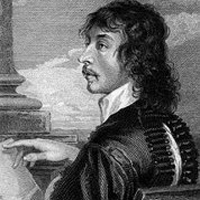Song: Ask me no more by Thomas Carew: Summary
In the beginning, the speaker surprises us by asking us not to demand answers to such questions from his side. The questions are at once childish as well as philosophical. As we move to the third line of each stanza, we immediately understand that the answers are self-manifested. The speaker, no doubt a lover, very much knows the answers. His beloved lady is at the center of his attention, and all the things help manifest her beauty and power.

Thomas Carew
The speaker praises the lady of her beauty and splendor. The beauty of a flower is a real happening. It captures the eyes and heart of the beholder. The flower and its beauty are transitory. After posing a question, the speaker immediately states that the flowers, and all their beauty, after fading and withering, return to the lady and become part of her beauty. The lady's beauty is the cause and the origin from which the beauty of all the flowers emanates.
This stresses on the physical perfection of the lady's beauty. After this, the speaker makes a sudden jump from Jove to Heaven. The golden particles or atoms of the day have increased the glory of the lady's hair. It was the larger imaginative conception of the God Himself to make the lady beautiful on earth. The speaker is wonderfully imaginative here. He believes that the heaven has prepared these tiny fragments, those "powders" to make the lady physically perfect. After this, the speaker reflects on the tune of the lady. The nightingale; the summer bird after singing and making the forest and valley replete with its melody returns to the lady. The bird hibernates (spends the winter in a state like deep sleep) in her throat preserving and cherishing (keeping warm) her musical and soothing voice (note). After this the speaker's mind flashes upward and feels that the 'falling stars' come to rest on the lady's eyes making them mysteriously beautiful, sparkling and flashing. Finally, the lady assumes the status of a Phoenix, the most famous fabulous bird capable of rising again and again after its death. The lady is elevated. This is a conceit, a hyperbole. Like the bird, the lady is capable of renewing her life. She is immortal, and she brings new lives on earth. The speaker tells us that we need not think where the miracle occurs — in the east or the west. He clearly states that the miracle of nature is in the lady herself. The lady herself is the Phoenix. The implication is that the lady is the source from which the whole life on earth springs. Here is the complete dependence of the speaker on her. His life and the future of their progeny entirely depend upon her.
The poem is a fascinating one. Without the use of adjectives and other figures of speech (similes and metaphors) the poet gives the powerful expression of the lady's beauty and inner quality. The expression like "your Beauties orient deep" underlies the mysteriously fabulous quality and the romantic aspect of the lady's beauty. The lady appears to us with all her beauty, musicality (nightingale), splendor and mystery (Phoenix).
Another aspect of the poem is its easy, graceful rhythm and the exquisitely shaped stanza pattern. The poem has a regular pattern of rhythm. Each stanza has two pairs of end-rhyming words, and almost all the rhyming words are musical.
The poem is composed in iambic tetrameter (eight syllables with unstressed and stressed syllabic pattern). Each line is divided into two halves: first two lines make an inquiry and the second two lines make a reply. The beautiful pattern of the poem, both in terms of its structure and sound perfectly, matches with the sense (the perfection of the lady's mysterious beauty). The poem is successful in its beautiful matching of the sense with the sound and pattern.
Literary Spotlight
 |
bachelorandmaster.com |